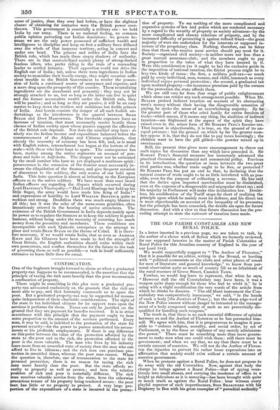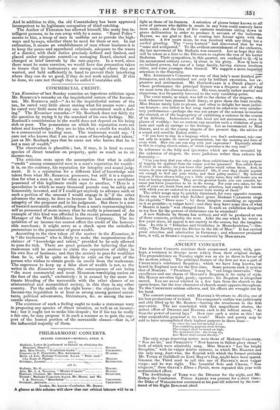THE OLD PARISH CONSTABLES AND NEW RURAL POLICE.
Ire a letter inserted in a previous page, we are taken to task, by the author of a clever work of fiction which we formerly reviewed, for our supposed heresies in the matter of Parish Constables or Rural Police for this Arcadian country of England in the year of our Lord 1842.
We would respectfully suggest to " The Author of Floreston," that it is possible for an editor, writing in the Strand, or herding with "political economists at the clubs and other places of resort for men of literature and general knowledge," to know from per- sonal observation quite as much of country life as an inhabitant of the rural recesses of Grove Street, Camden Town.
Further, we would beg leave to represent, that when he says, "However dull the old Constabulary may have been, it was a weapon quite sharp enough for those who had to wield it," he is using with a slight modification the very words of the article from which he thinks he dissents. "The old blunt instrument the Con- stabulary was comparatively innocuous," we said, "in the hands of such a body [the Justices of Peace]; but the sharp edge-tool of the New Police cannot without danger be intrusted to the manage- ment of a body composed mainly of such as are proverbially dis- qualified for handling such weapons." The truth is, that there is no such essential difference of opinion between us and the Author of Floreston as he has persuaded him- self. We agree with him, that it is preposterous to imagine it pos- sible to "enforce religion, morality, and social order, by act of Parliament, or by the force or vigilance of any merely administra- tive power." There must be something more than mere govern- ment to make men what one could wish them : still there must be government ; and when we say that, we say that there must be a certain amount of coercion. We will not do the Author of Flores- ton the injustice to pervert his rather loose expressions into an affirmation that society could exist without a certain amount of coercive government.
When he protests against a Rural Police, be does not propose to do away with the old Constables. Now, against that body the charge be brings against a Rural Police—that of spying vexa- tiously into small abuses, and carrying the insolence of office to a height as ridiculous as it is annoying—has been brought with quite as much truth as against the Rural Police : bear witness everi playful reprover of such impertinences, from SHAHSPERE with hut Dogberry to Box with his great exemplar of" porochial authori,ty " And in addition to this, the old Constabulary has been approved incompetent to its legitimate occupation of thief-catching. The Author of Floreston has allowed himself, like many less in- telligent persons, to be run away with by a name. "Rural Police" means to him, a troop of men in uniform set to patrole the high- way; and llways, whether there be need for them or not. In our estimation, it means an establishment of men whose business it is to keep the peace and apprehend criminals, adequate to the wants of a district, with their duties precisely defined and limited, and placed under adequate control—a managing Board, elected and changed at brief intervals by the rate-payers. In a word, since there must be some coercion, we would have due precaution taken to insure that its instruments are strong enough where they are wanted, and held sufficiently in hand to prevent their interfering where they can do no good, if they do not work mischief. If this be done, we care not though they be called Constables still.



























 Previous page
Previous page